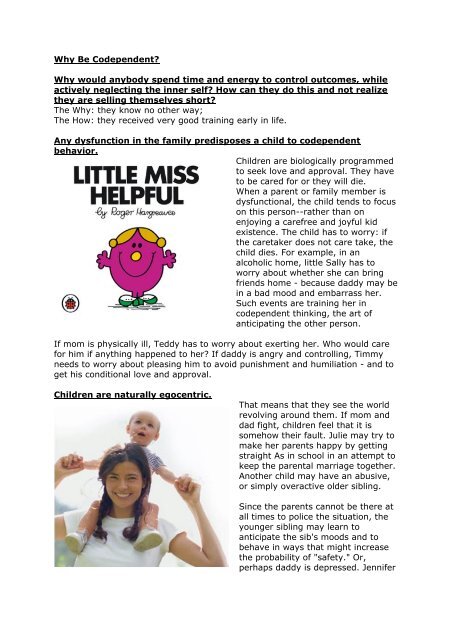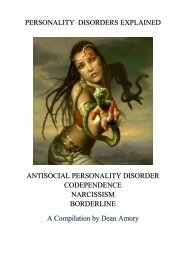CODEPENDENCE - DEAN AMORY
PERSONALITY DISORDER, CODEPENDENCE, RELATIONSHIPS, PSYCHOLOGY, LOVE, MATRIMONY, LIFE, LIVE,
PERSONALITY DISORDER, CODEPENDENCE, RELATIONSHIPS, PSYCHOLOGY, LOVE, MATRIMONY, LIFE, LIVE,
Create successful ePaper yourself
Turn your PDF publications into a flip-book with our unique Google optimized e-Paper software.
Why Be Codependent?<br />
Why would anybody spend time and energy to control outcomes, while<br />
actively neglecting the inner self? How can they do this and not realize<br />
they are selling themselves short?<br />
The Why: they know no other way;<br />
The How: they received very good training early in life.<br />
Any dysfunction in the family predisposes a child to codependent<br />
behavior.<br />
Children are biologically programmed<br />
to seek love and approval. They have<br />
to be cared for or they will die.<br />
When a parent or family member is<br />
dysfunctional, the child tends to focus<br />
on this person--rather than on<br />
enjoying a carefree and joyful kid<br />
existence. The child has to worry: if<br />
the caretaker does not care take, the<br />
child dies. For example, in an<br />
alcoholic home, little Sally has to<br />
worry about whether she can bring<br />
friends home - because daddy may be<br />
in a bad mood and embarrass her.<br />
Such events are training her in<br />
codependent thinking, the art of<br />
anticipating the other person.<br />
If mom is physically ill, Teddy has to worry about exerting her. Who would care<br />
for him if anything happened to her? If daddy is angry and controlling, Timmy<br />
needs to worry about pleasing him to avoid punishment and humiliation - and to<br />
get his conditional love and approval.<br />
Children are naturally egocentric.<br />
That means that they see the world<br />
revolving around them. If mom and<br />
dad fight, children feel that it is<br />
somehow their fault. Julie may try to<br />
make her parents happy by getting<br />
straight As in school in an attempt to<br />
keep the parental marriage together.<br />
Another child may have an abusive,<br />
or simply overactive older sibling.<br />
Since the parents cannot be there at<br />
all times to police the situation, the<br />
younger sibling may learn to<br />
anticipate the sib's moods and to<br />
behave in ways that might increase<br />
the probability of "safety." Or,<br />
perhaps daddy is depressed. Jennifer


















